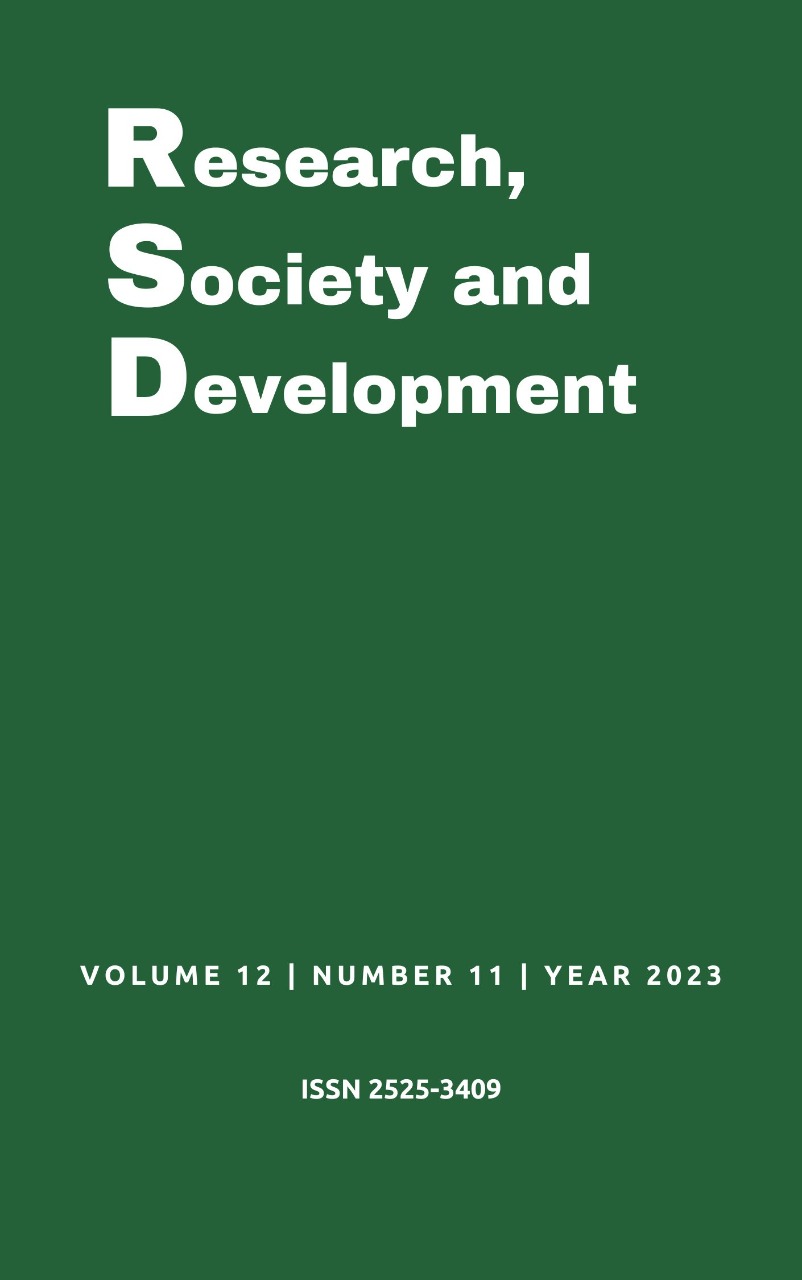Use of botulinum toxin in the depression treatment: An integrative review
DOI:
https://doi.org/10.33448/rsd-v12i11.43830Keywords:
Botulinum toxin type A, Depression.Abstract
Depression manifests as a set of symptoms that compromise an individual's quality of life. Due to the lack of success certain treatments in some patients, injections of botulinum toxin in the glabellar region have become a potential alternative to help alleviate symptoms associated with the psychiatric disorder. This is an integrative review on the use of botulinum toxin in the treatment of depression. We conducted a cross-referencing of the descriptors "Botulinum Toxin,"Depression, "Emotions," "Facial Feedback," and "Self-esteem" in the following databases: Scientific Electronic Library Online (Scielo), National Library of Medicine (PubMed MEDLINE), and Google Scholar. The location of BoNT/A facial injections is relevant to the success of depression treatment. Glabellar BoNT injections can reduce symptoms of mild to moderate depression. Botulinum toxin can also influence the proprioception of emotions, according to the facial feedback theory. Adverse effects associated with BoNT are generally mild and transiente. Depressive symptoms tend to resurface after a few months of injections, indicating that BoNT may be more effective when used as complementary therapy. Meta-analysis results demonstrate that BTX-A injections have been effective as an adjuvant treatment in Major Depressive Disorder (MDD). BTX-A presents itself as a highly relevant alternative for the treatment of depression. However, further research is needed to provide a deeper.
References
Arnone, D., Galadari, H., Rodgers, C. J., Östlundh, L., Abdel Aziz, K., Stip, E., & Young, A. H. (2021). Efficacy of onabotulinumtoxinA in the treatment of unipolar major depression: Systematic review, meta-analysis and meta-regression analyses of double-blind randomized controlled trials. Journal of Psychopharmacology, 35(8), 910–918. https://doi.org/10.1177/0269881121991827
Association, A. P. (2014). Manual Diagnóstico e Estatístico de Transtornos Mentais (5 ª ed.). Artmed. https://doi.org/10.1176/appi.books.9780890425596
Bulnes, L. C., Mariën, P., Vandekerckhove, M., & Cleeremans, A. (2019). The effects of Botulinum toxin on the detection of gradual changes in facial emotion. Scientific Reports, 9, 11734. https://doi.org/10.1038/s41598-019-48275-1.
Brin, M. F., Durgam, S., Lum, A., James, L., Liu, J., Thase, M. E., & Szegedi, A. (2020). OnabotulinumtoxinA for the treatment of major depressive disorder: A phase 2 randomized, double-blind, placebo-controlled trial in adult females. International Clinical Psychopharmacology, 35(1), 19–28. https://doi.org/10.1097/YIC.0000000000000290
Coles, N. A., Larsen, J. T., & Kuelz, A. (2019). Does Blocking Facial Feedback Via Botulinum Toxin Injections Decrease Depression? A Critical Review and Meta-Analysis. Emotion Review, 11(4), 294-309. https://doi.org/10.1177/1754073919868762.
Costa, A. C. de F., Da Silva, E. C., & Gondim, D. V. (2022). Botulinum Toxin in Facial Aesthetics Affects the Emotion Process: A Meta-analysis of Randomized Controlled Trials. Clin Psychopharmacol Neurosci, 20(4), 600–608. doi:10.9758/cpn.2022.20.4.600.
De Sousa, G. C., De Lima, T. B., De Almeida, V. C., & Lopes, T. d. R. (2023). Toxina Botulínica e o processamento das emoções: uma revisão de literatura sobre os efeitos além da pele. Brazilian Journal of Health Review, 6(3), 13250-13264. https://doi.org/10.34119/bjhrv6n3-378
Del Porto, J. A. (1999). Conceito e diagnóstico. Revista Brasileira de Psiquiatria, 21, 6-11. https://doi.org/10.1590/S1516-44461999000500003
Dong, H., Fan, S., Luo, Y., & Peng, B. (2018). Botulinum toxin relieves anxiety and depression in patients with hemifacial spasm and blepharospasm. Neuropsychiatr Dis Treat, 15, 33-36. doi:10.2147/NDT.S181820.
Dressler, D., & Adib Saberi, F. (2005). Botulinum toxin: mechanisms of action. Arquivos de Neuro-Psiquiatria, 63(1), 180-185. https://doi.org/10.1590/S0004-282X2005000100035.
E Sousa, F. G. de M. (1999). Tratamento da depressão. Revista Brasileira de Psiquiatria, 21, 18-23. https://doi.org/10.1590/S1516-44461999000500005
Fernandes, E. L., Amâncio, N. de F. G., Caixeta, C. A. S., & Saturnino, A. S. G. (2023). Principais tratamentos alternativos para a Ansiedade e Depressão: uma revisão de literatura. Brazilian Journal of Health Reviw, 6(1), 2062-2074. https://doi.org/10.34119/bjhrv6n1-161
Finzi, E. (2023). Botulinum Toxin Treatment for Depression: A New Paradigm for Psychiatry. Toxins, 15(5), 336. https://doi.org/10.3390/toxins15050336
Guilherme, T. J. F., Liberato, K. B. C., Leite, A. L., Moreira, J. A., & Canuto, A. (2022). Toxina Botulínica na Prevenção de Rugas Faciais. Revista Ibero-Americana de Humanidades, Ciências e Educação, 8(5), 2319-2333. https://doi.org/10.51891/rease.v8i5.5660
Lewis, M. B. (2018). The interactions between botulinum-toxin-based facial treatments and embodied emotions. Scientific Reports, 8, 14720. https://doi.org/10.1038/s41598-018-33119-1
Pimentel, F. de F., & Andrade, L. G. de. (2023). O uso da toxina botulínica no tratamento do envelhecimento precoce e no bem-estar do indivíduo. Revista Ibero-Americana de Humanidades, Ciências e Educação, 9(5), 4084. https://doi.org/10.51891/rease.v9i5.10243
Qian, H., Shao, F., Lenahan, C., Shao, A., & Li, Y. (2020). Efficacy and Safety of Botulinum Toxin vs. Placebo in Depression: A Systematic Review and Meta-Analysis of Randomized Controlled Trials. Frontiers in Psychiatry, 11, 603087. https://doi.org/10.3389/fpsyt.2020.603087
Wollmer, M. A., Magid, M., Kruger, T. H. C., & Finzi, E. (2022). Treatment of Depression with Botulinum Toxin. Toxins, 14(6). https://doi.org/10.3390/toxins14060383
Wollmer, M. A., Makunts, T., Krüger, T. H. C., & Abagyan, R. (2021). Postmarketing safety surveillance data reveals protective effects of botulinum toxin injections against incident anxiety. Scientific Reports, 11(1), 24173. https://doi.org/10.1038/s41598-021-03713-x
Zagui, R. M. B., Matayoshi, S., & Castelo Moura, F. (2008). Efeitos adversos associados à aplicação de toxina botulínica na face: revisão sistemática com meta-análise. Arquivos Brasileiros de Oftalmologia, 71(6), 894-901. https://doi.org/10.1590/S0004-27492008000600027
Downloads
Published
Issue
Section
License
Copyright (c) 2023 Maria Thereza de Oliveira Romão Pereira; Carla Rocha Bontempo; Eduarda Rocha Santos; Ulisses Rezende Brandão

This work is licensed under a Creative Commons Attribution 4.0 International License.
Authors who publish with this journal agree to the following terms:
1) Authors retain copyright and grant the journal right of first publication with the work simultaneously licensed under a Creative Commons Attribution License that allows others to share the work with an acknowledgement of the work's authorship and initial publication in this journal.
2) Authors are able to enter into separate, additional contractual arrangements for the non-exclusive distribution of the journal's published version of the work (e.g., post it to an institutional repository or publish it in a book), with an acknowledgement of its initial publication in this journal.
3) Authors are permitted and encouraged to post their work online (e.g., in institutional repositories or on their website) prior to and during the submission process, as it can lead to productive exchanges, as well as earlier and greater citation of published work.


